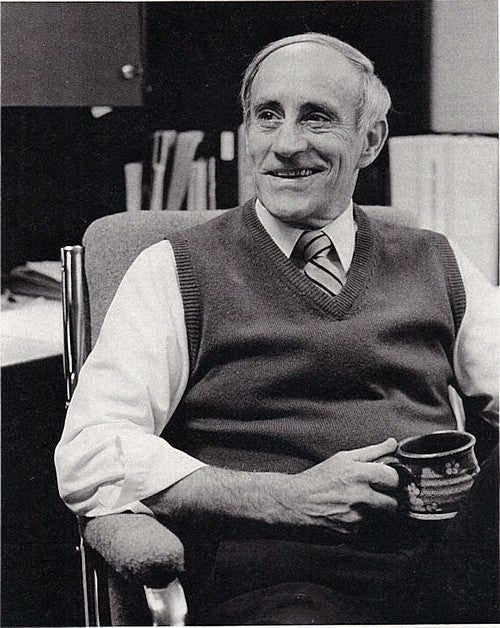bachelor of landscape architecture ’53
Kvarsten figured prominently in Oregon land-use law
Roseda Kvarsten stands on a small, shady dock and expertly fans a handful of small pellets across the surface of the large pond behind her home. Dimples from below the water’s surface and the occasional exuberant splash from a fish’s tail only add to the tranquility of the quiet rural setting.

“I think we must have climbed to the top of every mountain in Oregon,” Roseda says laughingly of their longtime hiking and climbing lifestyle.
That passion for experiencing nature and land drove Wes Kvarsten to be a prolific figure in 1960s and 1970s Oregon land-use planning evolution. With a storied, thirty-five year career in planning and public administration, Kvarsten’s accomplishments included figuring prominently in the writing of Oregon’s historic Senate Bill 10, passed in 1969.
The bill mandated that all of the state’s cities and counties adopt and enact land-use planning laws and zoning ordinances, whereas doing so had previously been an option. Then the executive director of the Mid-Willamette Valley Council of Governments, Kvarsten saw the bill as a vital step toward not only preserving forest and farm lands, but also to containing urban boundaries so that city services could be provided as efficiently and cost-effectively to as many as possible. His groundbreaking work and skills in communicating and mediating garnered him the respect of his peers, whether they were for or against the topic at hand.
“Wes was a facilitator. He could work out compromises, and people wouldn’t even know it was happening,” recalls Roseda.
Kvarsten’s investment in his community also extended to another passion: education. He mentored students at North Salem High School as part of a group that reviewed projects and provided professional guidance and feedback.
“He had a special way with young people,” says Roseda. “He made people feel like they were individuals and could think for themselves.”
Today, twenty-four years after his retirement and a decade after a second bout with cancer that even his deep commitment to physical activity and health could not overcome, Kvarsten’s professional legacy, giving disposition, and love for his alma mater are manifested at the University of Oregon’s Department of Planning, Public Policy and Management (PPPM) through the Kvarsten Endowment Fund. The fund was created with generous funding by the Kvarsten family to support, encourage, and advance faculty research and teaching in the department.
The family’s support of such research brings Wes Kvarsten’s legacy full circle. As a new graduate of the University of Oregon in the 1950s, he laid the groundwork for his ambitious career by working for the City of Springfield on an urban renewal project. His son, Erik, carries on that same tradition of public service.
“Our family was inspired and encouraged by the outstanding faculty at the University of Oregon,” says Erik, city manager of Gresham, Oregon. “We are pleased, through the Kvarsten Foundation, to help embolden the next generation of University of Oregon students.”
